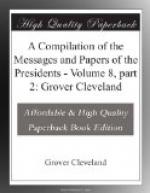Matters of minor importance will be the subjects of future communications, and nothing shall be wanting on my part which may give information or dispatch to the proceedings of the Legislature in the exercise of their high duties, and at a moment so interesting to the public welfare.
TH. JEFFERSON.
SPECIAL MESSAGES.
NOVEMBER 11, 1807.
To the Senate of the United States:
Some time had elapsed after the receipt of the late treaty between the United States and Tripoli before the circumstance drew particular attention that, although by the third article the wife and children of the ex-Bashaw were to be restored to him, this did not appear either to have been done or demanded; still, it was constantly expected that explanations on the subject would be received. None, however, having arrived when Mr. Davis went as consul to Tripoli, he was instructed to demand the execution of the article. He did so, but was answered by the exhibition of a declaration, signed by our negotiator the day after the signature of the treaty, allowing four years for the restoration of the family. This declaration and the letter of Mr. Davis stating what passed on the occasion are now communicated to the Senate. On the receipt of this letter I caused the correspondence of Mr. Lear to be diligently reexamined in order to ascertain whether there might have been a communication of this paper made and overlooked or forgotten. None such, however, is found. There appears only in a journalized account of the transaction by Mr. Lear, under date of June 3, a passage intimating that he should be disposed to give time rather than suffer the business to be broken off and our countrymen left in slavery; and again, that on the return of the person who passed between himself and the Bashaw, and information that the Bashaw would require time for the delivery of the family, he consented, and went ashore to consummate the treaty. This was done the next day, and being forwarded to us as ultimately signed, and found to contain no allowance of time nor any intimation that there was any stipulation but what was in the public treaty, it was supposed that the Bashaw had, in fine, abandoned the proposition, and the instructions before mentioned were consequently given to Mr. Davis.
An extract of so much of Mr. Lear’s communication as relates to this circumstance is now transmitted to the Senate, the whole of the papers having been laid before them on a former occasion. How it has happened that the declaration of June 5 has never before come to our knowledge can not with certainty be said, but whether there has been a miscarriage of it or a failure of the ordinary attention and correctness of that officer in making his communications, I have thought it due to the Senate as well as to myself to explain to them the circumstances which have withheld from their knowledge, as they did from my own, a modification which, had it been placed in the public treaty, would have been relieved from the objections which candor and good faith can not but feel in its present form.




